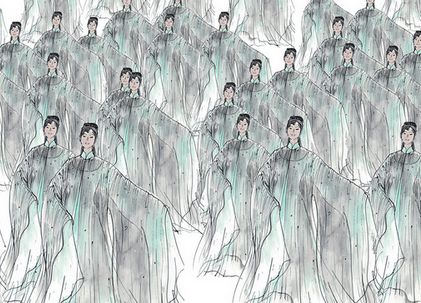 |
|
|
The Ballad of Canal, having been brewed for two years, will be put onto the stage from June 21st to 24th, around the Dragon Boating Festival. This is NCPA's first expolration of Chinese national opera performed in Chinese folk style singing. At the press conference in NCPA on the afternoon of April 24th, Deng Yijiang, vice-president of NCPA, together with the main writers and leading actors of The Ballad of Canal met the press for the first time, and briefed on the preparation status.
The Ballad of Cana is jointly organized by NCPA, Tongzhou District Committee and Tongzhou People's Government of Beijing. With two years' preparation, the opera is another significant product of NCPA in 2012. Since the opening four years ago, NCPA has been insisting on producing one or two original operas each year, Xi Shi and A Village Teacher in 2009, The Chinese Orphan in 2011, and the oncoming The Ballad of Canal in June this year, attempting to telling Chinese stories and highlighting humanity and mainstream values of Chinese nation.
Deng Yijiang, press spokesman of NCPA, says: "We can use opera, a universal language, to spread Chinese culture and achieve mutual and high-quality exchange between Chinese and foreign culture". Different from the former original operas, The Ballad of Cana is the first opera performed in Chinese folk style singing and nourished by the essence of Chinese culture such as traditional opera, folk music, and customs, showcasing the unique artistic texture and beauty of Chinese opera.
About the opera
 |
Leading Cast: Lei Jia and Wang Hongwei |
Production: National Centre for the Performing Arts
Composer: Yin Qing
Playwright: Huang Weiruo, Dong Ni
Conductor: Lu Jia
Director: Liao Xianghong
Stage Design: Liu Xinglin
Costume Design: Li Ruiding
Lighting Design: Hu Yaohui
Music Coach: Huang Xiaoman
Physical Director: Xiao Yanying
Leading Cast: Lei Jia, Wang Hongwei, Wang Li, Sun Li, Wang Zhe, Wang Zenan, Jin Tingting, Wang Hexiang
Chorus: NCPA Chorus
Orchestra: NCPA Orchestra
Beijing-Hangzhou Grand Canal with the history of over 2500 years is an artificial miracle on par with the Great Wall created by ancient Chinese. The original opera The Ballad of Canal is the first national opera presented by NCPA, in the style of folk singing. It describes the ups and downs of the characters on the canal and their vicissitudes including joys and sorrows, good and evil, life and death, as well as righteousness witnessed by the canal. The show integrates the cream of Chinese cultural essence like opera, folk songs and folk customs, showing the unique artistic texture and charisma of folk operas.
The creation of The Ballad of Canal takes two years. NCPA manages to develop a Chinese opera style different from the Western opera through the sincere and pragmatic artistic practices. The opera has gathered the top creation team in China including: director Liao Xianghong; writers Huang Weiruo and Dong Ni, jointly wrote a touching tearjerker story about Shui Honglian, Qin Xiaosheng and Guan Yanyan; the composer Yin Qing, once Sky Road and Entering a New Era, this time composed the beautiful melodies for the opera; the stage designer Liu Xinglin, presents a wonderful scroll of canal through his creative design. The opera is conducted by Lv Jia, the Chief Conductor of the Philharmonic Orchestra of NCPA. Excellent singers like Lei Jia and Wang Hongwei are ready to offer you an opera feast with national aesthetic charms through their amazing performances.
Synopsis
 |
|
|
During the Ming Dynasty, scholar Qin Xiaosheng is captured by the police for exposing official's corruption cases in Hangzhou. The folk singer Shui Honglian, resisting being a concubine, also fleeds to the banks of the canal. The two meet up at the sacrifice ceremony for the Dragon King of the river, on a song and dance tournament. They pose as performer on the dragon boat and escape. Qin wears sailor Li Xiaoguan's abandoned uniform and forfeits as a sailor. They take the boat of Zhang Shuiyao and went north along the canal in exile.
Meeting in trouble, they fall in love with each other, but the ship owner Zhang also has vicious love for Shui. Over Suzhou pier, the ship encountered Guan Yanyan, who, due to the romantic sailor Li's tricky plays, gave birth to a child and cried her eyes blind. Zhang convicts Qin to be Li Xiaoguan. To avoid arrestment, Qin has no way to speak up but is forced to live together with Guan. If the truth is told, Guan will resort to suicide; Qin and Shui are in immense grief.
Zhang finds out Qin's true identity and informs the police. In danger and emergence, Shui asks Qin to take Guan, with visual inconveniences, to go first, and leaves behind to stall for time.
Zhang bounds Shui to lure Qin to come back. To save her love, Shui ignites the lamp on board and burns the boat with herself on.
Qin wants to follow Shui away. But Guan asks him to finish the uncompleted cause of Shui, Qin is thus moved.
Qin and Guan come to Beijing and decide to denounce the corrupt officials to the Emperor.
Shui's love, beyond common love of common human beings, makes Qin and Guan find the home of soul of wanderers.
Editor: Liu Xiongfei




Why not rent a boyfriend, or girlfriend to please parents during the Spring Festival?